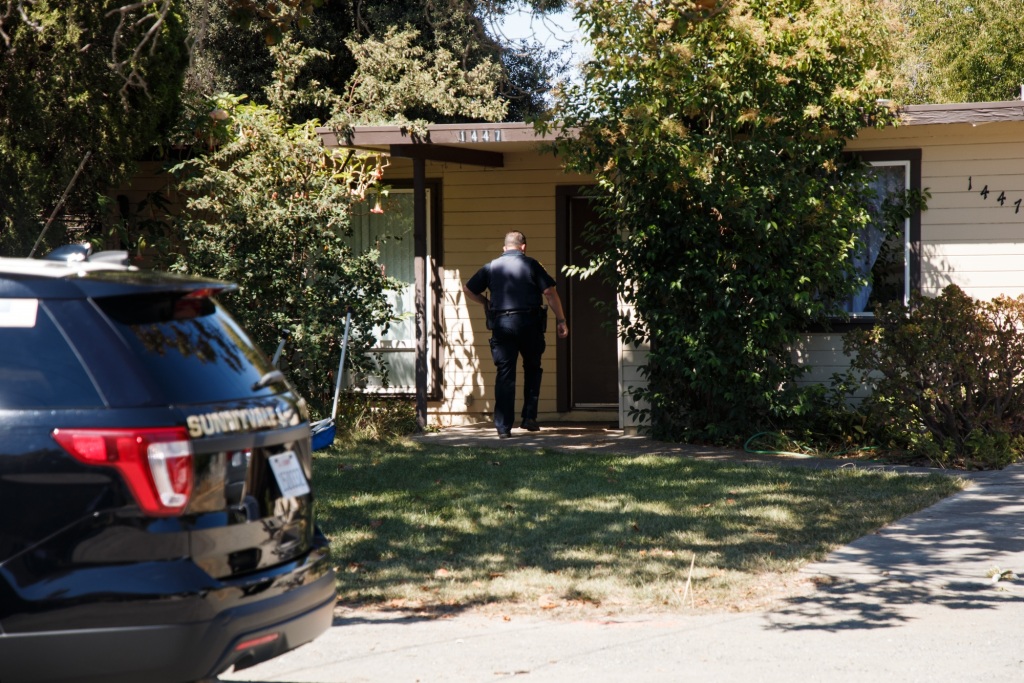A massive house party at an Airbnb rental in Sunnyvale last August where two young people were shot, one fatally, would almost certainly not have happened if the owner had obeyed a city law requiring her presence at the home, a new lawsuit by the state of California and city of Sunnyvale claims.
“It is extremely unlikely a massive, advertised house party would have occurred at the subject property had the ‘host’ actually been there,” the suit claims.
The state and city allege that Ke Zhou, of Maryland, appears to have bought the home solely to rent it out to temporary occupants, and that she broke Sunnyvale’s law against short-term rentals where the host is not present on the property.
Zhou “showed a complete and repeated disregard for the city’s laws,” the lawsuit filed Friday in Santa Clara County Superior Court claims.
Zhao also continues to advertise the house, in the Raynor Park neighborhood, as a short-term rental, the suit alleges. “The city’s research shows the address listed for both short- and long-term rentals online on Zillow,” Sunnyvale’s deputy city manager Jacqueline Guzman said Monday.
Contacted by phone Monday about the lawsuit’s claims, a person who identified as Ke Zhou said, “No comment.”
At least 150 young people had flocked to the Navarro Drive home after the party was advertised on social media. Gunfire killed Elias Elhania, 18, and wounded another person. A male Sunnyvale resident, 17 at the time of the shooting, was arrested in December on suspicion of murder and attempted murder.
It was at least the fourth shooting at an Airbnb party house in Northern California in less than two years, including a 2019 bloodbath that killed five in Orinda on Halloween. Zhou listed the home on Airbnb from July 2018 to August 2021, the suit alleges. The San Francisco company said it deactivated the listing after the shooting, which occurred despite the firm imposing a temporary ban on parties a year earlier in the wake of the Orinda tragedy. Airbnb in June said it was “officially codifying the ban” as company policy.
Zhou failed to obtain required permits and approvals to rent the home short-term, and she violated state and city nuisance laws, the suit also alleges. City law requires a short-term rental owner to reside on the property while renters are present, according to the suit.
“One of the main reasons for a ‘hosted’ requirement and the various registration and operational requirements is to avoid the short-term rental becoming a ‘party house,’ which unfortunately is exactly what the owner caused or allowed the subject property to become, with catastrophic consequences,” the suit claims.
It was unclear what evidence California and Sunnyvale had for claiming in the lawsuit that Zhou has continued to advertise the house as a short-term rental.
Property records indicate that Zhou has owned the house since 2014. The suit alleges that she violated Sunnyvale’s short-term rental law more than 1,000 times by promoting it as a short-term rental, and rented it out illegally for 461 days. She made at least $81,000 in “ill-gotten proceeds” renting it out, the suit claims.
Zhou’s violations affected the community through the party-night shooting, as well as through excessive noise, traffic congestion and “accumulation of refuse,” the suit alleges.
The city and state are seeking a court order banning Zhou from advertising and operating the home as a short-term rental. They also want a judge to force Zhou to hand over any revenue made through alleged illegal rental of the property, and to reimburse the city for enforcement costs related to the property.
The suit claims that there is a “real possibility” that if Zhou is not prevented through a court order from allowing “continued nuisance activity” at her property, “the nuisance activities will recur and continue to threaten the health, safety, and welfare of the neighbors and the public.”
Sunnyvale in may updated its short-term rental ordinance “to make it harder for hosts to evade our rules,” Guzman said. “These new requirements will make easier for city staff to investigate violations, take down illegal ads, and issue citations as necessary.”
Sunnyvale city data show that as of last week, 136 short-term rentals had city approval.
“The city is working to bring all short-term rentals into compliance with the city’s ordinance,” Guzman said.










